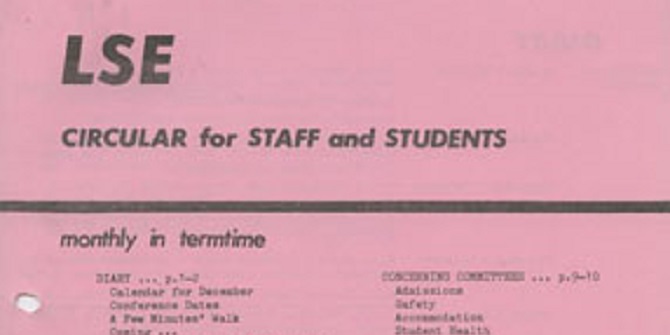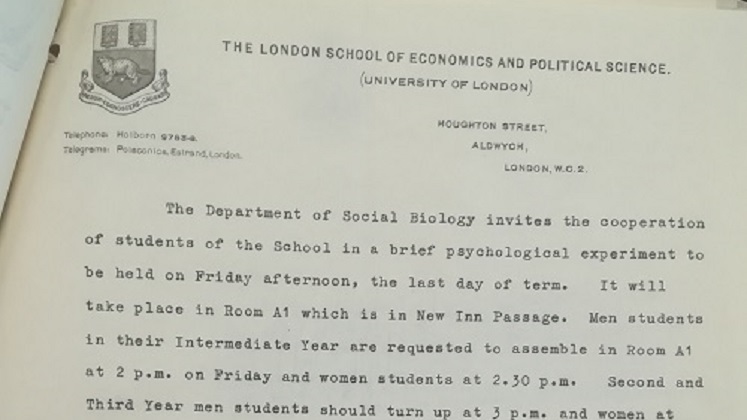While working as a graduate intern at LSE’s Eden Centre for Education Enhancement, Francesca Humi researched the General Election leaflet and manifesto collections at LSE Library to understand how concepts and policies on identity, race, and empire in the UK changed over the late 20th century and early 21st century.
Following World War II, British society experienced major changes. Britain was no longer a global titan, powered by an empire on which the sun never set. Emerging victorious, but significantly weakened after two world wars, the decades to follow would see decolonisation and independence of British colonies, new communities calling the UK home, the birth of the Welfare State, the Cold War, and European integration. These transformations in Britain’s identity and place in the world are reflected in political discourse since 1945. The goal of my research was to use leaflets and manifestos from general elections to document transformations overtime.

I selected the general elections of 1951, 1970, and 2017 because they occurred in the aftermath of major historical events and give insight into changing British morals and societal norms: the first wave of decolonisation in South Asia in the late 1940s, the rise of anti-migrant racism in the 1960s, captured by Enoch Powell’s infamous “Rivers of Blood” speech, and the 2016 referendum on European Union membership.
British conceptions of race and empire played major roles in these three elections – as a source of pride, nostalgia, or discomfort. However, race is often obscured in archives, rarely explicitly catalogued or indexed. Although a document or collection may contain references to the British Empire, as in many 1951 leaflets, or to race, these specific markers are rarely revealed through an online search of a library catalogue. It is the role of the researcher to reveal the unseen, making the focus on these elections is especially useful.
Overall, from 1951 to 2017, there is a shift in political discourse. Empire and peace, which are mentioned extensively in materials from 1951, are gradually replaced by immigration and borders by 2017. This shift is also reflected in the partisan landscape. In 1951, the Labour and Conservative parties stood firmly as the two dominant players, with the Liberal Party offering a modest alternative. However, following the 2016 Brexit referendum, the Lib Dems emerged as a major pro-European party, capable of challenging both Labour and the Conservatives, while the eurosceptic United Kingdom Independence Party dramatically disrupted British and European politics alike.
Post-War Britain was focused on maintaining peace in Europe and the world, whether through strengthening the British Empire, developing the United Nations, or supporting European integration. The question of decolonisation was highly important to British society and its political class. It brought anxiety for the Conservative Party, which prioritised “the safety, progress and cohesion of the British Empire and Commonwealth of Nations” and felt nostalgic for when Britain had been “respected, honoured and admired throughout the world”. Conversely, Labour celebrated the “peaceful independence” granted to present-day India, Pakistan, Sri Lanka, and Myanmar, and rebuffed Conservatives’ “Victorian imperialism and colonial exploitation”. Ideas of justice and inequality were formulated along class lines and racism was seen as an external issue, with the Liberal Party deploring racial apartheid in certain British colonies.



In 1970, the Conservatives and Labour clashed again over Britain’s legacy. Conservatives looked back to “yesterday’s achievements”, while Labour criticised Tory “inability to come to terms with the modern world”. A new issue erupted on the political stage: immigration. As people migrated from former colonies to the UK, modern multicultural British society was born and with it came a rise in racism.

Activists like Pat Arrowsmith loudly denounced it, but others stoked it – notably, Enoch Powell, the Conservative MP. The impact of his speech is evident in leaflets and manifestos: all three parties called for an end to “racial tensions,” while Labour and Conservatives promised to bring “mass immigration” under “firm control.” Labour celebrated legislation outlawing race-based discrimination and condemned racial violence in parts of the Commonwealth, as did the Liberal Party. Both parties also shared anti-military and pro-European views.

The aftershocks of the UK’s decision to leave the EU dominated the 2017 General Election. The Brexit campaign emphasised the need to secure British borders and stop so-called mass migration – echoing discourse from 1970. These ideas featured amongst all key parties, which now included UKIP and the Liberal Democrats. Matters of Empire and Commonwealth were eclipsed by the EU and Brexit, although language used by UKIP and the Conservatives evoked independentist discourse, casting the EU as an imperial force from which Britain should be freed. Parties appealed to voters by vowing to stop “out of control immigration”, “fighting the hard Brexit”, or by referencing personal histories of immigration.
Although race and empire aren’t immediately evident, reviewing these materials reveals their enduring role in the British political system and demonstrates how these concepts changed along with social norms to remain within British political consciousness.
The results of Francesca’s research were originally intended for an LSE Library exhibition which was cancelled due to the COVID pandemic.
Visit LSE Library’s British Political Parties collection and the online exhibition The Swing of the Pendulum: A History of UK General Elections.





